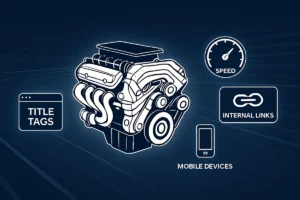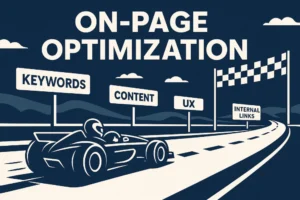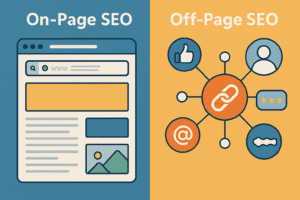In the bustling digital marketplace, where millions of online stores compete for attention, visibility is key. And when it comes to attracting a steady stream of potential customers without breaking the bank on advertising, SEO for Ecommerce reigns supreme. This comprehensive guide will walk you through the essential strategies and best practices to optimize your online store for search engines, ensuring your products shine brightly in search results and drive a torrent of organic traffic your way.
Why SEO for Ecommerce is Non-Negotiable
Imagine your Ecommerce store as a bustling shop on a busy street. SEO for ecommerce is like having a prominent storefront, eye-catching signage, and friendly staff who guide customers inside. It’s about making your online presence so compelling that search engines like Google can’t help but showcase your products to eager shoppers.
The benefits of investing in SEO for ecommerce are undeniable:
- Increased Visibility: Higher rankings in search results mean more eyeballs on your products.
- Organic Traffic: Attract potential customers who are actively searching for products like yours.
- Cost-Effective Marketing: SEO is a long-term investment that can generate sustainable traffic without hefty advertising costs.
- Enhanced Brand Credibility: Ranking high in search results builds trust and authority in your brand.
But mastering SEO for Ecommerce requires a strategic approach. It’s not just about sprinkling keywords here and there; it’s about understanding how search engines work, optimizing your website’s structure and content, and building a strong online reputation. A well-executed ecommerce SEO checklist for beginners can be an invaluable asset in this journey. An SEO optimized website helps you get a lot more sales.
Keyword Research: The Foundation of SEO for Ecommerce
To attract the right audience, you need to speak their language. Keyword research is the process of identifying the words and phrases (keywords) that your potential customers use when searching for products online. By incorporating these keywords into your website’s content, you increase the chances of appearing in relevant search results, thus improving your ecommerce SEO.
Several tools can aid your keyword research endeavors:
- Google Keyword Planner: A free tool that provides keyword ideas, search volume, and competition data.
- SEMrush: A comprehensive SEO suite that offers keyword research, competitor analysis, and more.
- Ahrefs: Another powerful SEO tool with a robust keyword explorer and backlink analysis features.
When conducting keyword research, consider both short-tail keywords (broad terms like “shoes” or “electronics”) and long-tail keywords (more specific phrases like “women’s running shoes” or “best noise-canceling headphones”). Long-tail keywords often have lower search volume but higher conversion rates, making them a valuable addition to your SEO strategy.
To further refine your keyword research, think about your target audience’s search intent. Are they looking for information (informational intent), comparing products (commercial intent), or ready to make a purchase (transactional intent)? Tailor your keywords to match their intent for better results.
On-Page Optimization: Fine-Tuning Your Ecommerce Website for Search Engines
On-page optimization is the art of refining the elements within your website to make it more appealing to search engines and improve your ecommerce SEO. This involves strategically placing keywords, crafting compelling content, and ensuring your site’s structure is easily crawlable and understandable for search engine bots.
Optimizing Product Titles and Descriptions for SEO for Ecommerce
Your product titles and descriptions are prime real estate for incorporating relevant keywords. Ensure that your titles are clear, concise, and accurately reflect the product. Include your primary keyword, SEO for ecommerce, in the title, along with any relevant long-tail keywords.
In the product descriptions, provide detailed information about the product’s features, benefits, and specifications. Naturally incorporate your primary keyword. For example, if ‘SEO for ecommerce’ is your primary keyword, make your secondary keywords something like ‘ecommerce seo checklist for beginners’ and ‘best seo practices for ecommerce websites’. Weave these keywords into the descriptions, ensuring the content reads smoothly and informs the potential customer. Aim to strike a balance between keyword optimization and providing a compelling narrative that entices customers to purchase.
Crafting Effective Meta Tags
Meta tags, including title tags and meta descriptions, provide a brief summary of your webpage’s content to search engines and users. Optimize your title tags with your primary keyword (SEO for ecommerce) and relevant secondary keywords (how to improve SEO for ecommerce website). Your meta descriptions should be concise, engaging summaries that encourage users to click through to your site, incorporating relevant keywords naturally.
Utilizing Header Tags (H1, H2, H3, H4)
Header tags help structure your content and make it easier for both users and search engines to understand. Use your primary keyword, SEO for ecommerce, in your H1 tag (usually the page title) and incorporate secondary keywords like step by step guide to ecommerce seo into H2, H3, and H4 tags as appropriate. This creates a clear hierarchy of information and reinforces the relevance of your content to search engines.
A Step-by-Step Guide to SEO for Ecommerce
- Conduct Thorough Keyword Research: Identify relevant short-tail and long-tail keywords using tools like Google Keyword Planner, SEMrush, or Ahrefs.
- Optimize Product Pages: Craft compelling titles and descriptions, incorporating your target keywords naturally.
- Optimize Meta Tags: Include your primary and secondary keywords in your title tags and meta descriptions.
- Use Header Tags Effectively: Structure your content with H1, H2, H3, and H4 tags, incorporating keywords strategically.
- Optimize Images: Compress images for faster loading, use descriptive file names, and include alt text with relevant keywords.
- Build Internal Links: Connect relevant pages within your website to enhance navigation and improve SEO.
- Ensure Mobile Responsiveness: Make your website adaptable to different screen sizes for optimal user experience.
- Prioritize Site Speed: Optimize your website’s speed to reduce bounce rates and improve search engine rankings.
- Create Unique Content: Avoid duplicate content and focus on providing valuable information to your audience.
- Address Common Ecommerce SEO Mistakes: Avoid keyword stuffing, thin content, and broken links.
By following this step by step guide to ecommerce SEO, you can ensure your website is well-optimized and primed for success in the competitive Ecommerce landscape.
Technical SEO: The Backbone of Your Ecommerce Website
[Internal Link: How to do Ecommerce Website Optimization in 2025: The Ultimate Guide]
While on-page optimization focuses on the visible elements of your website, technical SEO deals with the underlying infrastructure that ensures search engines can easily crawl, index, and understand your content. For Ecommerce sites, especially those built on platforms like WordPress, technical SEO plays a crucial role in achieving high rankings and driving organic traffic.
Website Speed and Performance Optimization
In today’s fast-paced digital world, users expect websites to load quickly. Slow loading times can lead to high bounce rates and lost sales. To enhance your ecommerce SEO, optimize your website’s speed by:
- Image Optimization: Compress images without sacrificing quality to reduce file sizes and improve loading times.
- Caching: Implement caching mechanisms to store static versions of your webpages, allowing them to load faster for repeat visitors.
- Content Delivery Networks (CDNs): Utilize CDNs to distribute your website’s content across multiple servers, improving loading speed for users in different geographical locations.
- Minifying Code: Remove unnecessary characters and spaces from your website’s code to reduce file sizes and improve performance.
Check out this article to further learn about ecommerce website optimization.
Mobile-Friendliness
With the majority of internet users now accessing websites on mobile devices, ensuring your Ecommerce site is mobile-friendly is no longer optional. Google’s mobile-first indexing means that the mobile version of your website is the primary version that Google uses for ranking and indexing. To optimize for mobile:
- Responsive Design: Use a responsive design that adapts seamlessly to different screen sizes and devices.
- Easy Navigation: Ensure your mobile menu is user-friendly and easy to navigate.
- Fast Loading Times: Optimize your website’s speed for mobile devices.
- Large Touch Targets: Make buttons and links easy to tap on touchscreens.
Structured Data Markup
Structured data markup is a code that you add to your website’s HTML to provide additional information about your content to search engines. This can help search engines better understand your products, leading to richer search results and potentially higher click-through rates. For Ecommerce sites, common types of structured data include product information, reviews, and pricing.
Common Ecommerce SEO Mistakes to Avoid
While implementing best SEO practices for ecommerce websites is crucial, it’s equally important to avoid common mistakes that can hinder your progress. Here are a few to watch out for:
- Keyword Stuffing: Overusing keywords in your content can negatively impact your rankings. Focus on creating natural, informative content that incorporates keywords organically.
- Duplicate Content: Avoid having duplicate content across your product pages. Each page should have unique and valuable content.
- Thin Content: Don’t neglect the importance of high-quality content. Each product page should have a detailed description, images, and relevant information to help customers make informed decisions.
- Broken Links: Regularly check for and fix broken links, as they can negatively impact user experience and SEO.
By avoiding these common ecommerce SEO mistakes and implementing the technical SEO best practices outlined in this guide, you can lay a solid foundation for your online store’s success in search engine rankings.
Link Building for SEO for Ecommerce: Strengthening Your Website’s Authority
In the realm of SEO, links are like votes of confidence. When other websites link to yours, it signals to search engines that your content is valuable and trustworthy. This can significantly boost your website’s authority and improve its ranking in search results.
Earning Backlinks from Reputable Sources
The key to successful link building is to focus on quality over quantity. A few high-quality backlinks from authoritative websites are far more valuable than a large number of low-quality links. Here are some strategies to earn backlinks for your Ecommerce site:
- Create High-Quality Content: Publish informative blog posts, product guides, or industry insights that other websites would find valuable and want to link to.
- Guest Blogging: Contribute articles to reputable blogs or websites in your niche, including a link back to your own site in your author bio.
- Outreach: Reach out to other website owners, bloggers, or influencers in your industry and ask them to link to your content if they find it relevant and helpful.
- Social Media Promotion: Share your content on social media platforms to increase visibility and attract potential link opportunities.
- Directories and Listings: Submit your website to relevant online directories and industry-specific listings.
The Power of Internal Links for SEO for Ecommerce
While external backlinks are important, don’t overlook the power of internal links. Linking to relevant pages within your own website can help search engines understand your site’s structure, improve user navigation, and distribute link equity throughout your site.
Measuring Your Link Building Success
Track your link building efforts and measure their impact on your website’s SEO performance. Use tools like Google Search Console and Ahrefs to monitor your backlinks, track your website’s ranking for target keywords, and identify new link building opportunities.
By consistently building high-quality backlinks and optimizing your internal linking structure, you can strengthen your website’s authority and improve its visibility in search results. This, in turn, can lead to increased organic traffic and higher conversions for your Ecommerce business.
Local SEO: Targeting Customers in Your Area
If your Ecommerce business has a physical presence or serves a specific geographic region, local SEO is a crucial component of your overall SEO strategy. Local SEO focuses on optimizing your website to rank higher in local search results, which can be a significant source of targeted traffic.
Optimizing Your Google My Business Listing for SEO for Ecommerce
The cornerstone of local SEO is your Google My Business (GMB) listing. Make sure your GMB profile is complete and accurate, including your business name, address, phone number, website URL, hours of operation, and categories. Regularly update your GMB listing with posts, photos, and videos to keep it fresh and engaging.
Building Local Citations
Local citations are online mentions of your business name, address, and phone number (NAP) on other websites. Consistent NAP information across various platforms helps establish your business’s credibility and improve your local SEO ranking. Submit your business information to local directories, industry-specific websites, and online review platforms.
Local Link Building
Earn backlinks from local websites, such as local news outlets, blogs, or community organizations. These links can signal to search engines that your business is relevant to local searches.
Optimizing for Local Keywords
Incorporate location-specific keywords into your website’s content, meta tags, and Google My Business listing. This can help your website appear in search results when users search for products or services in your area.
Content Marketing: Fueling Your Ecommerce Growth Engine
Content marketing is a powerful tool for attracting, engaging, and converting potential customers. By creating valuable, relevant, and informative content, you can establish your brand as a thought leader in your industry, build trust with your audience, and drive organic traffic to your Ecommerce website.
As you embark on your Ecommerce SEO journey, remember that content is king. A well-crafted content strategy can attract and engage potential customers, build brand loyalty, and ultimately drive sales. We can help you develop a tailored content strategy that aligns with your business goals and resonates with your target audience. Book a FREE call today for a free consultation.
Types of Content for SEO for Ecommerce
Ecommerce businesses can leverage a variety of content formats to connect with their audience:
- Blog Posts: Share informative articles, how-to guides, product reviews, or industry insights to attract and educate potential customers.
- Product Guides: Create detailed guides that help customers choose the right products for their needs.
- Lookbooks: Showcase your products in visually appealing ways through curated collections and style guides.
- Customer Testimonials and Case Studies: Share real-life stories of satisfied customers to build social proof and credibility.
- Videos: Create product demonstrations, tutorials, or behind-the-scenes videos to engage your audience on a deeper level.
- Infographics: Present complex information in a visually appealing and easy-to-understand format.
Content Creation Tips for SEO for Ecommerce
To maximize the impact of your content marketing efforts, follow these best practices:
- Focus on Quality: Create high-quality, well-researched content that provides genuine value to your audience.
- Be Relevant: Tailor your content to the interests and needs of your target audience.
- Be Consistent: Publish new content regularly to keep your audience engaged and coming back for more.
- Promote Your Content: Share your content on social media, email newsletters, and other channels to reach a wider audience.
- Track Your Results: Measure the performance of your content to identify what’s working and what’s not, and adjust your strategy accordingly.
Content Marketing Strategies for SEO for Ecommerce
To get the most out of your content marketing, consider these strategies:
- Create a Content Calendar: Plan your content in advance to ensure a consistent flow of fresh content.
- Repurpose Content: Transform existing content into different formats (e.g., turn a blog post into a video or infographic) to reach a wider audience.
- Use a Variety of Content Formats: Experiment with different content types to appeal to diverse learning styles and preferences.
- Incorporate User-Generated Content: Encourage customers to create and share content related to your brand.
- Leverage Influencer Marketing: Partner with influencers in your niche to promote your products or services.
By implementing a well-rounded content marketing strategy, you can attract a loyal following, drive organic traffic to your website, and ultimately boost sales for your Ecommerce business.
Conclusion: WordPress: Your SEO-Friendly Ecommerce Ally
Mastering SEO for Ecommerce is a continuous journey, but by following the strategies outlined in this guide, you can significantly enhance your online store’s visibility, attract organic traffic, and ultimately boost sales. Remember, SEO is not a one-time fix; it requires ongoing effort and adaptation to the ever-changing algorithms of search engines.
If you’re looking to build an Ecommerce store that is optimized for SEO from the ground up, consider partnering with a web design agency specializing in WordPress development. A well-structured, SEO-friendly website can provide a solid foundation for your online success. We specialize in building high-performance WordPress Ecommerce websites that are optimized for search engines, ensuring your products get the visibility they deserve. Book a FREE call today to learn more about our Ecommerce web design services.
WordPress, with its vast array of SEO plugins and themes, offers a user-friendly and flexible platform for building and optimizing your online store. With the right tools and strategies, you can harness the power of SEO to drive organic traffic, increase conversions, and achieve sustainable growth for your Ecommerce business.
By staying informed about the latest SEO for ecommerce trends and best practices, and by continuously optimizing your website and content, you can ensure that your online store remains competitive and thrives in the dynamic world of Ecommerce.
FAQ
1. What is SEO in ecommerce?
Ecommerce SEO is the process of optimizing your online store to rank higher in search engine results pages (SERPs) for relevant keywords. This involves improving your website’s visibility, driving organic traffic, and ultimately increasing sales.
2. Is SEO worth it for ecommerce?
Yes, SEO is absolutely worth it for ecommerce! It’s a cost-effective way to attract highly targeted traffic to your online store, leading to increased brand awareness, customer engagement, and sales. Unlike paid advertising, SEO results are sustainable and can provide long-term benefits.
3. How much does ecommerce SEO cost?
Ecommerce SEO costs can vary widely depending on the size and complexity of your website, the competitiveness of your industry, and the scope of the SEO services you require. It’s essential to get quotes from reputable SEO agencies or consultants to determine the best fit for your budget and goals.
4. What is the best website for ecommerce SEO?
While various platforms offer e-commerce functionality, WordPress with WooCommerce is often considered one of the best options for SEO. Its flexibility, vast array of SEO plugins, and customizable themes make it easy to optimize your online store for search engines.
5. How to build an SEO strategy?
Building an effective SEO strategy involves several key steps:
- Keyword research: Identify relevant keywords your target audience uses to search for products.
- On-page optimization: Optimize your website’s content, titles, meta descriptions, and images for your chosen keywords.
- Technical SEO: Ensure your website is fast, mobile-friendly, and easy for search engines to crawl.
- Link building: Earn high-quality backlinks from reputable websites to boost your site’s authority.
- Content marketing: Create valuable content that attracts and engages potential customers.
6. Which platform is SEO friendly?
WordPress is widely regarded as one of the most SEO-friendly platforms available. Its clean code, customizable structure, and abundance of SEO plugins make it easy to optimize your website for search engines.
7. Is SEO high paying?
SEO is a valuable skill set that can lead to high-paying careers. Experienced SEO professionals are in demand and can command competitive salaries. Whether you work as a freelancer, consultant, or in-house SEO specialist, there’s potential for significant earning potential.
8. Is Shopify better for SEO? (explain why WordPress is better)
While Shopify is a user-friendly e-commerce platform, WordPress with WooCommerce offers greater flexibility and control over your SEO efforts. WordPress allows for more customization, deeper integration with SEO plugins, and greater control over your website’s code, all of which can contribute to better SEO results.
9. How do I rank an e-commerce website?
Ranking an e-commerce website requires a multifaceted approach:
- Comprehensive keyword research: Identify and target relevant keywords with high search volume and low competition.
- Technical optimization: Ensure your website is fast, mobile-friendly, and has a clear site structure.
- High-quality content: Create informative and engaging product descriptions, blog posts, and other content that incorporates your target keywords.
- Backlink acquisition: Earn backlinks from reputable websites to boost your site’s authority.
10. How to do on-page SEO?
On-page SEO involves optimizing individual web pages to rank higher in search results. This includes:
- Keyword optimization: Incorporate your target keywords into your page titles, meta descriptions, headers, and content.
- Image optimization: Use descriptive file names and alt text for your images, and compress them for faster loading.
- Internal linking: Link relevant pages within your website to help search engines understand your site’s structure.
11. Do ecommerce websites need SEO?
Absolutely! Ecommerce websites need SEO to compete in the crowded online marketplace. SEO helps potential customers find your products, drives organic traffic to your site, and ultimately leads to increased sales.

I design high-performing WordPress + Elementor websites and WooCommerce stores that rank on Google and convert visitors into customers. At Katmantra Web Design and SEO, I combine clean design with smart SEO so your site works as hard as you do.







